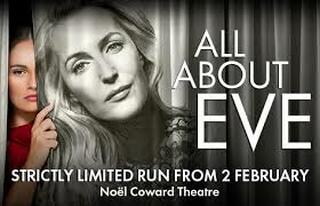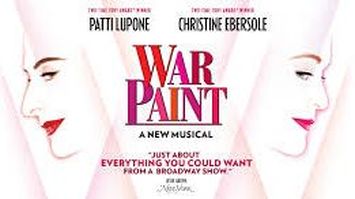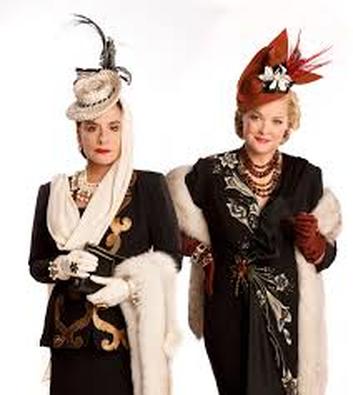 Condensed, Silly Fun at Opera Undone: Tosca & La Bohemeby Randi / February 12, 2020
Condensed, Silly Fun at Opera Undone: Tosca & La Bohemeby Randi / February 12, 2020It’s Theatre Thursday! Today’s show is The Visit, which opens tonight and plays at the National Theatre (Olivier Theatre) until May 13.
Full confesh time: As soon as The Visit went on sale, I bought tickets to the first preview because I assumed it was the Kander & Ebb musical version that I never got to see on Broadway with Chita and I was like YESS I CAN FINALLY SEE THIS WEIRD AF SHOW THAT DID THE TONY AWARDS PERFORMANCE THAT MADE ME UNCOMFORTABLE! It is not the musical version. This is the latest adaptation of the classic 1956 German play, more faithful to the original than the musical (and the many other adaptations that have come before) and this time translated/written by Tony Kushner, if you can believe it. (“If I can believe it? Watch this – I believe it!”) The Visit, a classic play about humanity, revenge, and also the stain of capitalism (true), tells of the world’s richest lady, Claire Zachanassian, who returns to her poverty-stricken hometown and makes them an offer they should refuse but don’t. The questions it raises about morality and greed and wrath are the sort that stick with you and make you uneasy, a sign of effective theatre.
Although I have lots of problems with the third act and the overall success of the show, I enjoyed this production and recommend seeing it, if only for the strong star turns from the great Lesley Manville and Hugo Weaving (who I took a picture with at one of the Lord of the Rings premieres but it was before smartphones and I don’t know where that photo is dammit). Kushner’s adaptation updates the location of the action to New York state, namely the destitute town of Slurry, which is a terrible name (on purpose; the original German name was supposed to evoke manure). When the hot witch? seductive demon? sexy bionic elder lady Claire finally comes back for a visit (the visit) after leaving as a teen, the down-on-their-luck residents hope that she will be their savior. Maybe if she paid enough in taxes you wouldn’t have to rely on her feeling philanthropic! Claire indeed is willing to give the town lots of money, like the kind that starts with a ‘b’ and that no private citizen should have control of. This money would more than save the town; it would make every penniless resident rich. But there’s a condition, and it’s dark, which you guessed because she is a scary scary sexy lady (like the song from Crazy Ex Girlfriend): she will only give the money in exchange for what she considers ‘justice’. Her version of ‘justice’? The townspeople killing her ex-boyfriend Alfred. YEP.
So like, 40 maybe 50 years have passed since Claire and Alfred, who still lives in Slurry, had their little teenage romance, and despite 7 husbands and traveling all over the world and becoming the richest person on earth, Claire is still angry that Alfred broke up with her. Or so it seems at first. At first you’re like oh this bitch cray, no one in that town better think twice about telling her to shove her money. I mean you’re talking about MURDER. But despite initially laughing off her proposal and telling Alfred that they would never even consider it, the townspeople slowly start to realize how much their lives would change by sacrificing just one eensy person.
And as more details come out about their history, what Claire suffered through, and who exactly composes her entourage (this part straight f-ed me up), you understand Claire’s position better: Alfred didn’t just abandon her. What he did was pure evil. I completely get being furious about what he did for decades and wanting some kind of justice. But, murdering him isn’t justice. My biggest disappointment with this show is that at no point does anyone say that murdering a wrongdoer does not beget justice, and that enacting such revenge doesn’t help anyone. Every time someone said the word justice I thought to myself “you keep a-using that word. I don’t-a think you know what it means.” I had recently watched The Good Place finale, so the whole ‘he did a horrible deed 50 years ago and should be punished eternally for it’ thing was a stark contrast to that show’s message that everyone should at least have a chance at redemption. (I mean not that Alfred ever seemed interesting in apologizing for his actions, but I guess that would have changed things too much.)
The first act was quite gripping, despite a slow start due to some weird acting choices on the part of the townspeople (also in New York state there should not be southern accents, but that is the most common ‘American accent’ choice usually). Also in that first kind of rocky opening were some REALLY WEIRD lines about Jews? Like very very disturbing that would be okay if anything came of them or they were supposed to be important but it just felt like random slurs? I’m really surprised at Kushner here, who is a Jew, and what he was trying to achieve. I have noticed his other works having such weird anti-Jew lines almost seemingly for the hell of it, not doing anything with them to make it worthwhile (I wonder if he uses it as an easy way to show that certain characters are flawed/bad, not realizing how anti-Semitic London/UK/Europe is). It took me out of it for a bit as I tried to understand his purpose. Ugh I got Kushlash.
Then, the second act is truly superb, one of the best, most gripping pieces of theatre. It was only 45 minutes and every second of that was perfectly calibrated. As the townspeople grapple with their decision, the whole play felt like a slow creeping movement towards evil, almost like a secret of the ooze, and it’s reflected incredibly in the blocking, with excellent direction from Jeremy Herrin. If the first act’s dark comedy was a B, this second act’s riveting psychological thriller was an A+.
And then the third act was beyond disappointing. It didn’t effectively capitalize on the gripping psycho-drama proffered in Act II. So much happens that is indefensible from a dramaturg perspective: Why don’t Alfred’s wife and kids seem to care about what’s happening AT ALL? Why is Alfred letting the press take pictures of him and his family in his shop? Why is this townsperson pretending to stab Alfred for a photo – when the journalist asking for it has NO idea about the deal?? (That last one really bugs me to no end. Like wtaf.) That is nonsense. There’s also so much that needed to be cut: the entire car ride with Alfred’s family was a waste of time, as was the horrible annoying TV personalities doing their bits at the town meeting, and then, to add insult to injury, repeating everything because their feeds weren’t working or something. This was some real nonsense that almost had me screaming.
So this first preview was four hours (although it never really felt long at all; it was well paced aside from some bullshit in the third act). A few days later, I saw on the NT website that the run time had been amended to 3 hours 50 minutes, and then a few days later to 3 hours 40 minutes, and now it’s at 3 hours 30 minutes. I hope that’s all due to work on the third act, because if ONE SECOND of the second act was touched, that’s a real tragedy. (Apparently the Broadway musical version was 95 minutes, which is hilarious to me. What did Chita just show up and sing one song and then they all do a murder and you’re out before you even have to pee? I peed 5 times during this event.)
But the most disappointing thing (well the TV reporters bit was pretty terrible) was that there is no discussion of forgiveness, or redemption, or how by considering this offer the townspeople are just as bad or worse as teenage Alfred. While the play is overall pretty good, always interesting, and almost never boring, it’s still such a wasted opportunity for exploring these themes. There is so much fodder for how to deal with remorse and past sins as well as anger and desire for vengeance, and of course what actual justice is, but any real contemplation of all this happens offstage.
INFORMATION
There are two intervals so regardless of what the ever-changing run time is, that’s always good.
My favorite place to sit in the Olivier is the front row of the circle. I usually do stalls but the Olivier is such an enormous cavern of a place that you get a better view from the circle. Also the inner aisles are pretty central. Best of all, it’s formed so you only see the stage and none of the people in the stalls on their phones. Also people don’t seem to know that there are bathrooms on either side of the circle, inside the doors, and there are usually okay lines. What does have a line is the new water dispenser on the bar, which is a nice idea but now since there’s only one instead of a few pitchers that line is longer than the bar’s!
My best tip for the NT as always is to bring your small bag, not a big one. They make you check purses and backpacks &c that are bigger than like a piece of paper.






